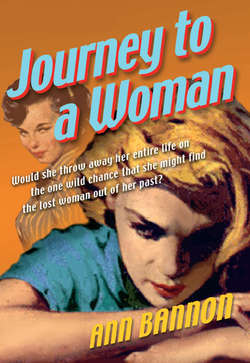Читать книгу Journey To A Woman - Ann Bannon - Страница 4
Introduction I. Foreword/Forward
ОглавлениеWhen these stories of lesbian love were forged nearly half a century ago, I thought—I knew—that I was writing ephemeral literature for a casual audience. That was what was being asked of me, and what I tried to do. I had no fine ideas of recording the saga of a community, nor that these stories would come to have real sociological or historical value. Quite truly, I had no thought that I was preserving a slice of GLBT history that would help to form the perceptions of the era for succeeding generations. I thought I had been given the opportunity to write popular throwaway tales for an avid, if fleeting audience, and that was quite enough. I would write them the very best I could, understanding from the beginning that the first one would be forgotten even as the second was being written. I had not the slimmest sliver of recognition that what I was really given was the opportunity to speak for my generation of young gay and lesbian people.
It is interesting to speculate as to whether or not such knowledge would have destroyed these books. It would have made them more carefully crafted, but also immeasurably more cautious. It very likely would have made them self-conscious and defensive, as well. Instead, they are fully flawed and full of life. It’s a trade off, and on the whole, perhaps for the best. All I can say now to the wonderful young people who power our amazing community is, “Thank you for caring about these stories. Take what you can, learn what you can, and know that they flowed uncensored from the imagination of a girl in her twenties, sitting alone by a typewriter and dreaming up a life she wanted to share with you. Bless you for being there to read about it.”
When it was suggested to me that I write introductions to most of the new Cleis Press editions of my books, it sent me back to reread the original stories. It also propelled me back in time. It had been over twenty years, dating to the Naiad editions of the early 1980s, since I had immersed myself in them. And twenty-five years before that when the actual writing had been accomplished.
Perusing my novels again was a trip in a time machine, an exercise both embarrassing and exhilarating. How very young I was! How deep those feelings ran! And how startlingly sparse was my worldly knowledge. All of the books were completed and in print before I was thirty years old. And now in my sixties, I resisted going back to visit them again. But the rereading was essential. As George Santayana is supposed to have said, “How do I know what I think till I see what I said?”
As I reacquainted myself with my authorial life and times, several themes seemed to emerge and to run like threads through all of the books. There is not room to analyze all of them here, but one or two stand out. The first is the emotional development and personality portraits of the characters themselves; the sheer punch of the interior drama, that so fascinated me. I wanted to follow them and discover how the characters connected to one another, why they chose the partners they did. The other was the symbolic use of liquor and cigarettes as the banners of liberation. I’d like to look at these themes as they apply to Journey to a Woman.
